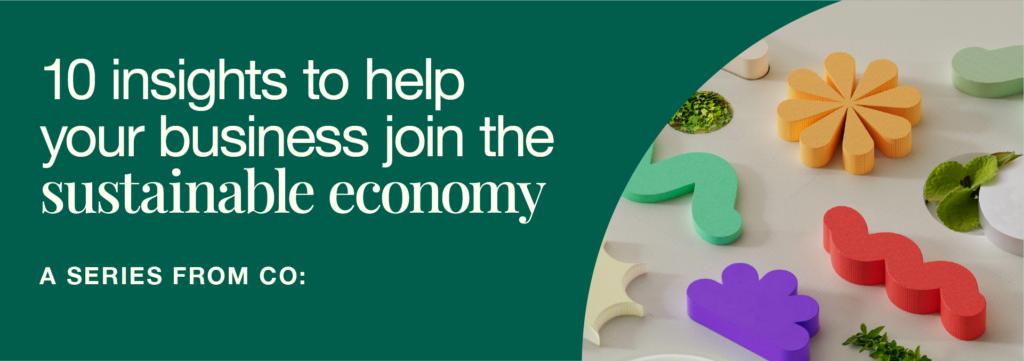‘Sustainability’ has come to mean everything, and nothing.
The more intentional you are in your language, the greater impact you’ll create.

This is the sixth of a series of 10 insights from co:collective on how your business can join the sustainable economy.
In 1972, ‘sustainability’ was a radical concept
Let’s set the scene. It’s the mid-70’s, and industrialization is escalating harm to the planet. An article is published called “Blueprint for Survival,” and introduces a term called ‘sustainability.’ It describes a systemic end-state, where we ‘meet the needs of the present without compromising the ability of future generations to meet their own needs.’ This article urges society to dramatically alter its course, recommending we immediately shift towards smaller, de-industrialized communities – and claims this is our only option. ‘Sustainability’ begins as a concept so revolutionary that it actually goes on to form the foundations of a new political party (the Green Party). (x)
Flash forward to present-day: the urgency of the environmental crisis has climbed to an all-time high. And yet, the word ‘sustainability’ itself has almost completely lost its meaning.
The issue: ‘sustainability’ has moved from being a word with discrete meaning to a vague signal.
Before, ‘sustainability’ described an outcome. Now, it’s used as a descriptor, that signals something positive in a murky way. What does ‘sustainable transportation’ mean? It could refer to reduced carbon emissions, or renewable energy sources, or even affordability. What does it mean when a garment’s materials were ‘sourced sustainably’? It might mean it’s recycled, or upcycled, or made with fair labor practices, or made with lower carbon emissions.
In these examples, ‘sustainable’ is a catch-all for ‘all things planet.’ It’s non-specific enough to avoid accountability, but strong enough to make consumers feel good about what they’re buying.
Shared language is an open door
Yes, precision is always important – but when it comes to communicating about the environmental crisis, it’s absolutely critical. It’s key to educating consumers, so they can be smarter about where they put their dollar. It’s key to transparency, so brands can be celebrated for their progress, and held accountable for their actions. And it’s key to collaboration, so stakeholders can scale their impact and drive meaningful progress.
And ‘sustainability’ is only one example – other terms are in danger of conflation as well, making the space even more hazy and even less approachable.

So as you communicate:
→ Avoid buzzwords. Opt for more specific words that describe your effort.
→ Get specific. Use proper terminology to explain your progress, and unpack what you really mean, taking opportunities to educate your audience.
→ Add detail. Nuances do make things complicated, but oversimplification isn’t the way to make something more accessible. Getting detailed and staying accurate is key.

By Preeya Ninan
Senior Strategist
Preeya is a strategist who focuses on developing strategic brand foundations. She believes the most important step in solving a problem is asking the right question, and prioritizes language as a driver of purpose-led work.
